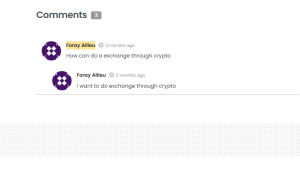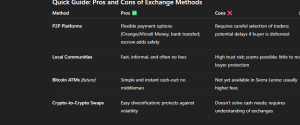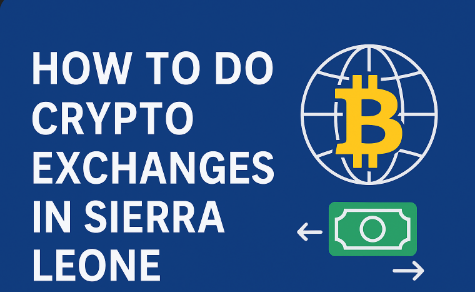As cryptocurrency adoption expands in Sierra Leone, more citizens are exploring Bitcoin as an investment and a tool for remittances and cross-border payments.
However, while interest is rising, many still struggle to understand the practical side of crypto, especially how to exchange it safely.
On May 6, we published an article titled “Buying Bitcoin in Sierra Leone: A Beginner’s Guide to Crypto Trading.” Following that piece, a reader, Foray Allieu, raised a key question:
“How can I do an exchange through crypto? I want to do an exchange through crypto.”
This follow-up article addresses that question, explaining how Sierra Leoneans can exchange cryptocurrency, whether swapping Bitcoin for another digital asset or converting it into cash.

What does exchange through crypto mean?
When people talk about exchanging crypto, they usually mean one of two things:
1. Crypto-to-crypto exchange – converting Bitcoin into another cryptocurrency, such as Ethereum or USDT.
2. Crypto-to-cash exchange: selling Bitcoin or another cryptocurrency in return for Sierra Leonean Leones (SLL) through mobile money, bank transfers, or cash.
To make this practical, imagine you have Le 3,000 (about $100) worth of Bitcoin. Depending on your needs, you can either swap it for USDT to protect against Bitcoin’s price swings or sell it to another Sierra Leonean through Orange Money and receive Le 3,000 directly.
How to exchange crypto-to-crypto
For people who want to diversify beyond Bitcoin, crypto-to-crypto swaps are the easiest route.
Centralised Exchanges (CEX): Platforms like Binance and KuCoin let users swap Bitcoin for Ethereum or stablecoins like USDT. After setting up an account, deposit your Bitcoin and click “Convert.”
Decentralised Exchanges (DEX): Apps like Uniswap or PancakeSwap allow wallet-to-wallet swaps without intermediaries.
These are useful if you prefer privacy and use Trust Wallet or MetaMask.
For instance, Mariatu, a small business owner in Freetown, accepts Bitcoin from her brother in the U.S. for remittances.
Instead of keeping it all in Bitcoin, she converts half into USDT on Binance. This shields her from price drops while allowing her to cash out the other half when needed.
How to exchange crypto for cash in Sierra Leone
For most Sierra Leoneans, the bigger question is: how do I turn Bitcoin into money I can spend?
1. Peer-to-Peer (P2P) platforms
The most popular option is P2P trading, where buyers and sellers connect directly.
How it works: You sell your Bitcoin, and the buyer sends payment via Orange Money, Africell Money, or a bank transfer.
Platforms: Binance P2P and Paxful are common. They provide escrow services, meaning the Bitcoin is held safely until the payment is confirmed.
A practical example is Alusine, a student in Bo who sells Le 1,500 worth of Bitcoin on Binance P2P.
The buyer pays him through Orange Money within minutes. Once Alusine confirms receipt, Binance releases the Bitcoin to the buyer.
2. Local crypto communities
Some Sierra Leoneans exchange crypto informally within trusted circles. This can be fast but riskier if you don’t know the other person well. Always meet in safe spaces and avoid carrying large amounts.
Just like a group of traders in Makeni often pool their Bitcoin and exchange it with a known community trader who pays them in SLL, it’s convenient, but it relies heavily on trust.
3. Bitcoin ATMs (Not available for now)
While Sierra Leone doesn’t yet have Bitcoin ATMs, they spread across Africa. In Nigeria and South Africa, ATMs allow users to sell Bitcoin and receive cash instantly.
Sierra Leone could see such services if adoption continues in the coming years.

Reader’s note
Exchanging Bitcoin in Sierra Leone, whether swapping it for another coin or cashing out to Leones, is becoming more practical as adoption grows.
Foray’s question shows that many Sierra Leoneans are interested in buying Bitcoin and learning how to use it daily.
From students cashing out school fees to small business owners protecting against inflation, crypto is slowly finding real applications.
As the ecosystem develops, more opportunities will emerge, possibly including Bitcoin ATMs and more exchange platforms tailored to West Africa. Until then, choose your method wisely and always prioritise security.
But anyway, do you have a question about cryptocurrency in Sierra Leone, just like Foray Allieu did? Share it in the comments or reach out directly; we may feature your question in a future guide to help the community learn together.

















